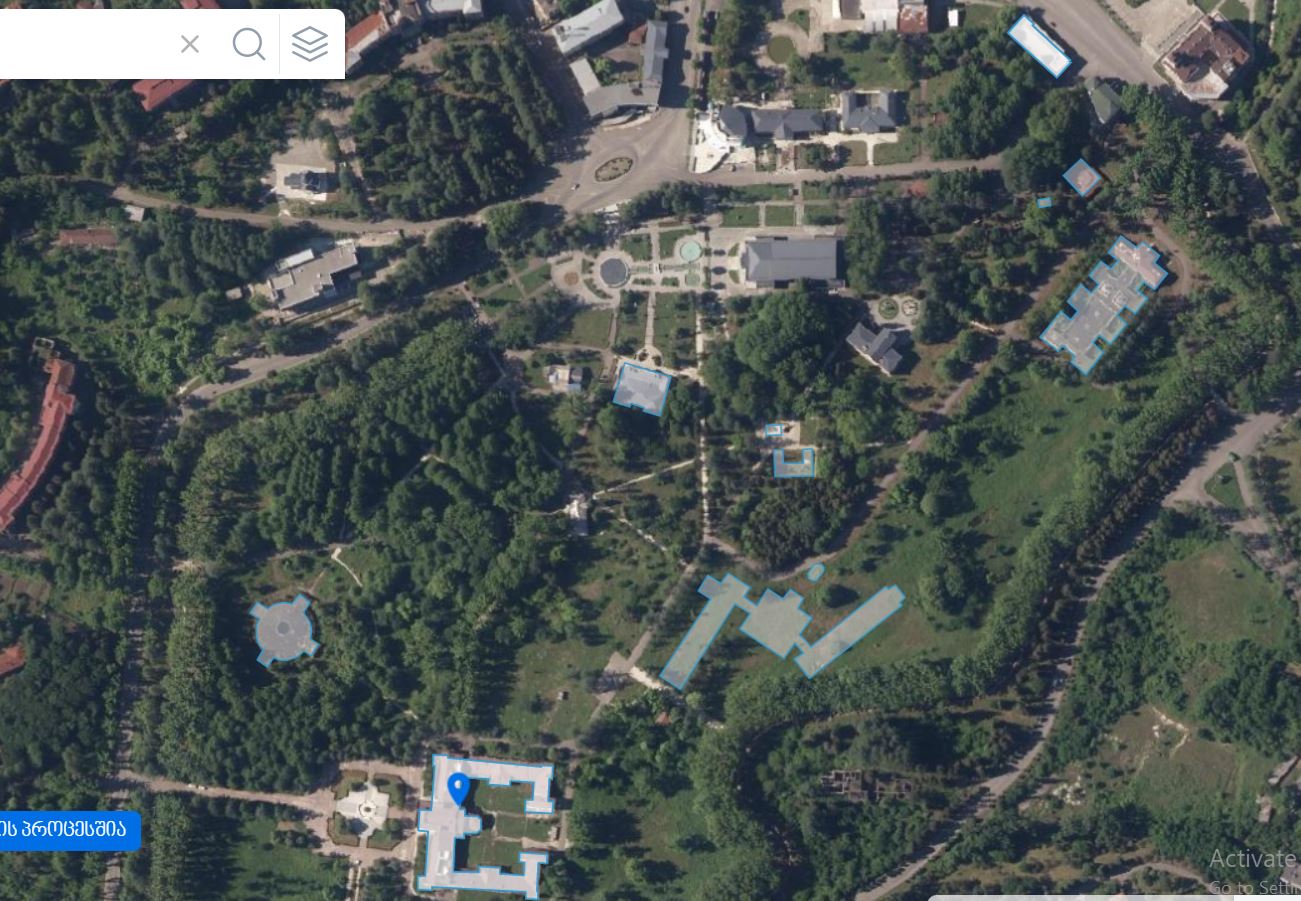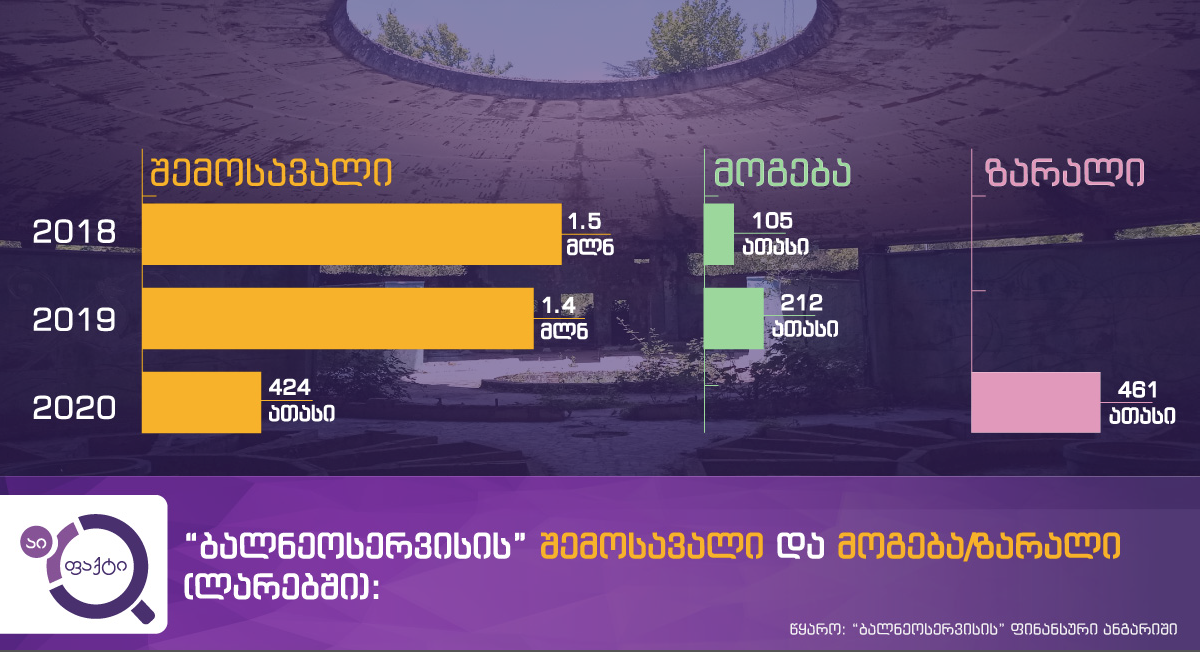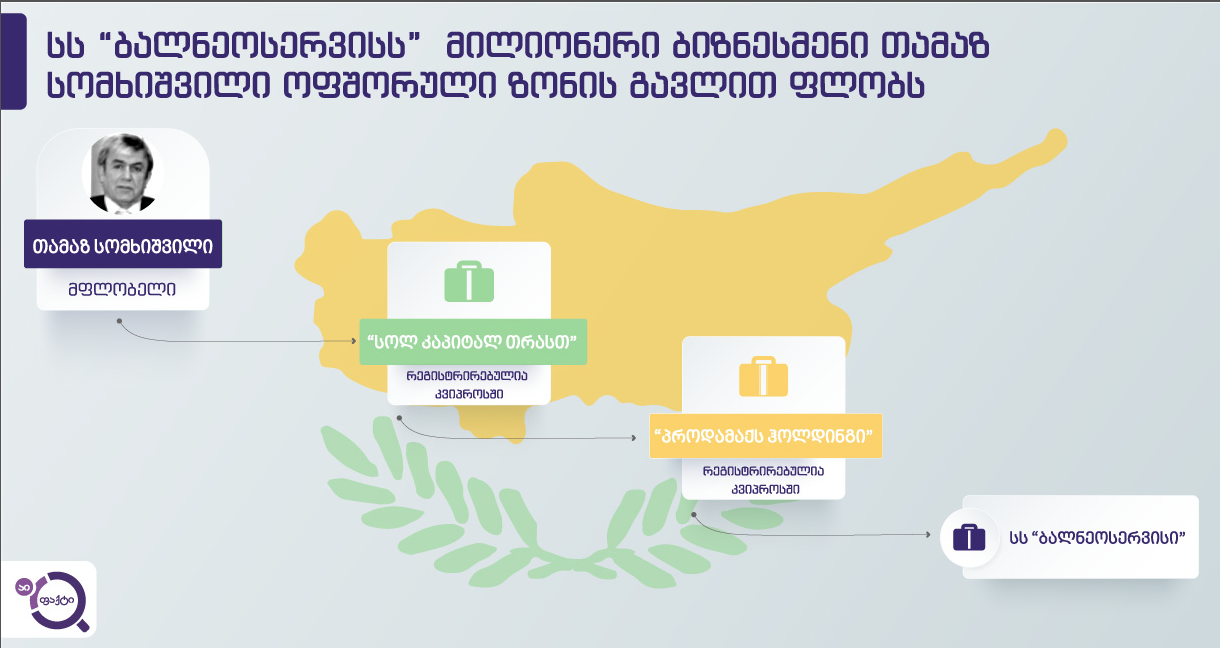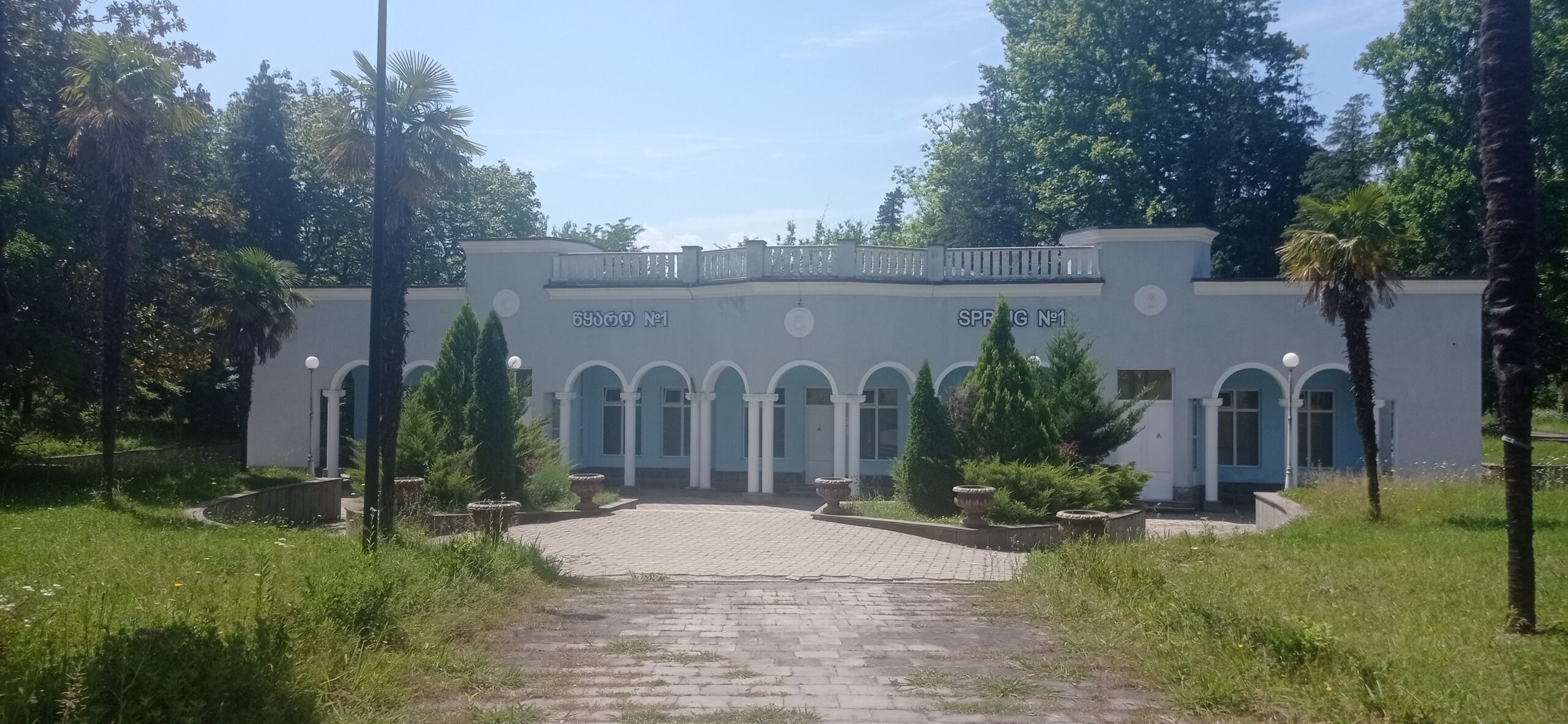

How did the government buy Tskaltubo water?
A favorable deal between the government and a businessman makes the future of Tskaltubo thermal waters unclear. Another non-profitable asset was added to the pool of state assets. We paid 25.5 million GEL for it from the budget.
Author: Shorena Laghadze
For the last three years, the government has been making promises about the development of Tskaltubo. The government showed interest in this small, green resort town after Bidzina Ivanishvili expressed his desire to invest here. However, almost three years after the oligarch made the above statement, we see that the government's promises are the same farce as Ivanishvili's.
Four months ago, Prime Minister Gharibashvili declared that the development of Tskaltubo was hindered by the fact that the main wealth of the resort i.e. thermal waters were owned by private owner. "During the government of Saakashvili, your favorite prisoner, Tskaltubo waters were sold to a private businessman. That made it impossible to invest there, as the main wealth like Tskaltubo waters was unavailable to businesses. How could one develop the place?!” - said the Prime Minister to the media in April.
According to the Prime Minister's plan, the Tskaltubo waters returned to the state should again be transferred to private businessmen. There is a proverb in Georgian – “I bought a goat, I sold a goat.” Why does is matter for the government, which businessman owns natural resource? However, it matters for our government, as all parties to the deal have benefited from it.
Tskaltubo waters have been in state ownership for eight months already and it’s unclear how the country might benefit from it.
"They bought out the estate in advance with the promise to create more favorable conditions to attract investors. I am a bit suspicious of such an approach. As a rule, when it comes down to it, there is a corrupt deal, and the license to use these resources is issued to the businesses and business groups closely tied to the government with some vague conditions. This risk is always inherent in the ownership of any asset by the state," explained Valery Kvaratskhelia, an economic analyst of the Reforms Association of Georgia.
From whom did the government buy the Tskaltubo balneo-service?
In April the public learned from the Prime Minister that the government bought back the property JSC Balneoservice in Tskaltubo and thermal waters license for 8.1 million USD. This information was disclosed this year, while the Ministry of Economy purchased the baths from JSC Balneoservice last December. It turns out that the property has been in the hands of the state for eight months, and so far nothing has been done to sell it.
JSC Balneoservice was established in 1996 and was given a title to the infrastructure and land plots around Tskaltubo's thermal waters free of charge by the government as part of privatization process.
In 2012, the mentioned company paid 200,000 GEL for a 25-year license to use the waters for therapeutic baths.

Until 2022, JSC Balneoservice owned 11 land plots with total area of 1.7 ha on the territory of the Tskaltubo Central Park, with baths located on it, a license for extracting thermal water, medical and technical equipment necessary for therapeutic procedures, as well as a fountain and an underground structure (beauty spring).
After obtaining the license, JSC Balneoservice started to arrange the necessary infrastructure for tourist-recreational purposes and restored the baths. According to the license, 4.5 million GEL should have been spent on the rehabilitation of the buildings and the renovating the medical equipment, although the actual amount spent is unknown. No information is publicly available on that.
The company also paid taxes to the local budget of Tskaltubo municipality: in 2015-2022, it contributed one million GEL. However, JSC Balneoservice could not be considered a profitable company. Before the pandemic, in 2018-2019, the company had a profit of only 317,000 GEL, while it ended 2020 with a loss of almost half a million.

In recent years, the owner of the company indicated in the offshore documents that the total value of the assets of the mother company which owned the JSC Balneoservice amounted 397,224 USD.
Considering the mentioned circumstances, perhaps 25 million GEL offered by the state to the owner should not have been a bad deal at all.
We tried to contact the owners of JSC Balneoservice, Tamaz Somkhishvili, and the former CEO, Zaza Dzneladze, to find out why they sold out this business. We called Tamaz Somkhishvili on the official number of his company, TS Holding, we wrote to the company's email and Facebook page, but received no response. Tamaz Somkhishvili’s contact information is nowhere to be found, representatives of other media also informed us that no one has ever succeeded to contact this millionaire. We also wrote to Zaza Dzneladze on the social media, but he did not respond as well.
Somkhishvili owns JSC Balneoservice through a Cyprus offshore zone.
98 percent of the shares are owned by the company Prodamax Holding registered in Cyprus. The Ministry of Defense of Georgia and some other individuals hold the remaining 2 percent of shares.
Prodamax Holding belongs to Sol Capital Trust. Its Ultimate Beneficial Owner is a millionaire Tamaz Somkhishvili, who has dual Georgian and British citizenship.

Somkhishvili also has ties to Russia with his business activities. In 1992-2008, he worked as a director of the Russian company Lukoil-s, Lukoil-Market and JSC Rosneft Export. He was a shareholder of a Russian joint-stock company Tomskaya Neft in 2002-2004.
It seems that Somkhishvili has good relations with the Georgian patriarch and is favorable towards the current government of Georgia. In public interviews he has mentioned having private talks with Ilya II and has expressed positive attitude towards the government stating that they care for the welfare of the people and are criticized for nothing.
What could one say about caring for the people, but it seems that the government has taken care of itself and has not forgotten Somkhishvili’s welfare as well. Here is how this story goes.
On December 29, 2021, the state bought movable and immovable property, as well as the license from JSC Balneoservice. Six days before the purchase, the Ministry of Economy asked the Samkharauli National Forensic Bureau to appraise the property. The experts calculated the value of JSC Balneoservice according to the forecasted revenues for the next five years. With this method, the property was appraised at 47.6 million GEL - 15.3 million USD with the exchange rate for the time.
The seller itself valued the property at 17.2 million USD in 2020. In the letter sent to the then Minister of Economy Ms Turnava, the director of Balneoservice wrote that they took into account the interest of the state and therefore agreed to sell the estate for 8.1 million USD.
A good deal is one in which both parties are satisfied. The government will tell us that it was purchased below market price, on the other hand the business did not lose as well if we take a look at the company's profitability and offshore documents.
It is interesting that before the state showed its interest, the family of businessman Badri Kakabadze was planning to buy the JSC Balneoservice. They own 2 out of 8 baths in Tskaltubo, and wanted to buy the rest from Tamaz Somkhishvili.
Badri Kakabadze's son, Davit Kakabadze, had talks with Somkhishvili about the sale for 4 years. According to him, the last communication took place in September-October 2021. The owner of JSC Balneoservice demanded payment of 10 million USD from the Kakabadze, but in the end changed his mind about selling the business. In three months, Somkhishvili sold Tskaltubo baths and the license to the state for 2 million dollars less. Davit Kakabadze did not want to negotiate anymore, as according to him the business was not worth of 10 million USD.

"When you are in big business, you may have other kind of communication with the government. I don't know, it's not my business. I know that based on today's revenues that business is not even worth of 8 million dollars. The assets that Somkhishvili sold are unprofitable. This was a decision modeled on the future by the state," said Davit Kakabadze.
One thing is how much the state paid for it and the other - how the expert calculated the value of the business. Independent auditors told us that the method used by the Samkharauli Bureau is subjective.
Mindia Tabagua, an auditor says that during the evaluation of JSC Balneoservice the Samkharauli Bureau made the so-called discounting method, which is an approved method in such cases. However, one detail is important - different auditors may analyze the situation in different ways and assign different values to the same business.
“The evaluation [of a business] by an auditor is quite subjective. Even when applying the same method, I may make an assumption that this will be the case and therefore construct a different reasoning," said Mindia Tabagua.
"[Discounting] is a good method, though a bit subjective, allows for a lot of manipulation and is sensitive to many assumptions," said BDO auditor, Beka Chikovani.
iFact became interested in how and by whom the necessary negotiations were held before the purchase, how the price of thermal waters was calculated, and in general, why it was decided to buy a non-profitable business. In 2020, instead of profit, the company inflicted losses of 461 thousand GEL.
The Ministry did not answer these questions. We would have been surprised more if they did.
What are the risks associated with state ownership of Balneoservice?
Now the assets of JSC Balneoservice and the license for thermal waters belong to LLC Thermal Waters of Tskaltubo. Asset Management and Development Company owns this state enterprise. The function of the company is rehabilitation-reconstruction and leasing of buildings owned by the state. So far, they have not taken care of transferring Tskaltubo waters to a private person. The nine months have passed since the purchase and no auction has been announced.
Tskaltubo baths are not found in the list of properties for lease and auction of Asset Management and Development Company. According to the National Agency of State Property, the sale of thermal waters is not yet planned, but it may be sold in the future.
According to economists, there is nothing wrong with the state preventing the existence of monopolies in business, on the contrary, it is an established practice. However, the transfer of private assets to the state is questionable and creates corruption risks.
Economist Nodar Sirbiladze, co-founder of the Economic Transformation Center, believes that if Tskaltubo baths remain state property, they will be less profitable.

"If we compare the state owned property and privately owned property and the efficiency of the two it is like black and white. The property in the hands of the state is conserved. If it is used, it is used inefficiently and the economic benefits from it are less than in the private sector. If the private sector loses, it will be responsible for the losses, and if the state owned company suffers losses, you and I will also be responsible for it, as in the end, all of this is financed by budget," says Sirbiladze.
Economist Ramaz Gerliani explains that if the private sector and the state agree to sell something to each other, this is a natural phenomenon. However, if the state itself intends to manage the business, this is unacceptable and poses the risk of possible corruption.
"In the market economy, the state should create the favorable conditions for businesses instead of running a business itself. Where and when it can be done by a private sector, it should be done by a private sector. In the case of the state, two main things stand out - inefficiency and signs of corruption, i.e. the interests of specific subjects. The private sector does not steal from its own pocket while the state always does. It usually turns out after 4-5-7 years that business was ineffective and we, the tax payers, were paying for it.” says Gerliani.
iFact continues to work on this topic. In the future we will keep an eye on the steps made by the government, whether or not it takes care of the development of the resort, and finally who will be granted with the therapeutic waters of Tskaltubo considered the "business card" of the resort, many businessmen, as promised, or the one friendly to them.
- Tskaltubo Waters purchased for 8 million USD, has been state owned for nine months and they are not going to sell it yet. How this asset will benefit us is unclear.
- The state burdened itself with another unprofitable business. We bought Tskaltubo Waters from JSC Balneoservice for 25.5 million GEL.
- If the private sector loses, it will be responsible for the losses, and if the state owned company suffers losses, you and I will also be responsible for it, as in the end, all of this is financed by budget,"
Economist Nodar Sirbiladze
4. Balneoservice income and profit/loss (in GEL)
Income Profit Loss
2018 1,5M 105K -
2019 1,4M 212K -
2020 424K - 461K
Source: "Balneoservice" financial report
5. JSC "Balneoservice" is owned by millionaire businessman Tamaz Somkhishvili through the offshore zone.
Tamaz Somkhishvili (photo)
↓
Sol Capital Trust (registered in Cyprus)
↓
Prodamax Holding (registered in Cyprus)
↓
JSC Balneoservice


